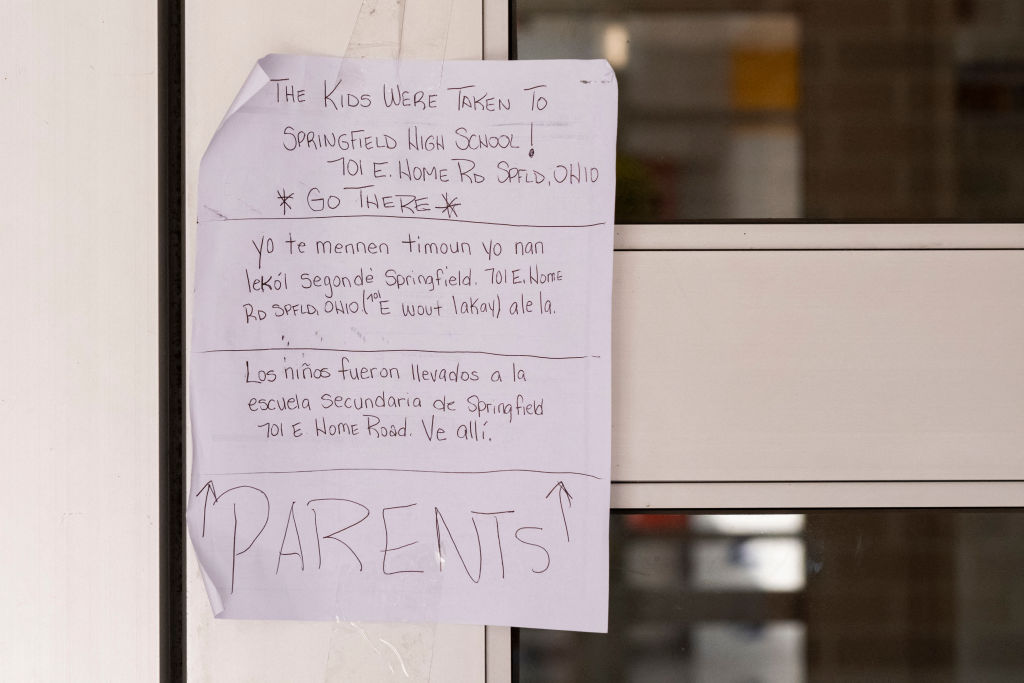SPRINGFIELD, Ohio—They come to Ohio from one of the most desperately poor places in the Western Hemisphere. They have few to no belongings. In many cases, they are uneducated, and most don’t speak English well. They do not understand the local culture where they have settled—and it shows: in their dress, in their speech, in their manners, in their housing arrangements, in the food they eat, and in the music they dance to.
Most profess to be Christians, but many maintain superstitious folk magic traditions from their homeland, and many quietly hold to a belief in witchcraft. They blithely violate social taboos. Locals complain that they are stealing their jobs, driving up costs, and consuming too much in the way of social services. And then there are the dietary norms: Though the rumors no doubt exceed the reality, some of them eat animals not generally considered food by the good people of Ohio. Ask the locals, and many of them will quietly say that they wish they would all go back to where they came from.
But that was a long time ago. And while J.D. Vance’s hillbilly ancestors may not have been the inbred, possum-eating, superstitious bushwhackers of legend and lore, as they descended on Ohio from the hills of Kentucky they had more than a little in common with the Haitian immigrants Sen. Vance now spends his days vilifying in terms that would have been familiar to Fritz Hippler, the filmmaker whose 1941 propaganda film Der ewige Jude comes to its climax with images of leering kosher butchers covered in the blood of animals slaughtered in the service of “the so-called Jewish religion.”
Lord Acton would have us believe that it takes absolute power to corrupt absolutely. But even the dream of the vice presidency—that “bucket of warm piss” in the immortal words of Vice President John Nance Garner—will do the trick, if you are the right kind of person.
By which, of course, I mean the wrong sort of person—the wrong sort to wield power. You can send little J.D. to Yale to make him polished, you can send him to Silicon Valley to make him rich, and you can send him to the Senate to make him powerful, but you cannot stop him from being what it is he apparently wants to be: Cleetus the Gap-Toothed Twitter Troll.
Poor people have been coming to Ohio in search of jobs in its factories and warehouses for centuries: From the original New Englanders who settled in the Northwest Territory to the Scots-Irish to the Irish and Germans in the 19th century to the Haitians today, that story has been repeated over and over. At the turn of the 20th century, a majority of Cincinnati’s population consisted of those who either were foreign-born or were the children of foreign-born parents, mostly German. Naghten Street in Columbus, on the other hand, became “Irish Broadway” in the middle of the 19th century. The J.D. Vances of that era didn’t much care for the whiskey-drinking, potato-eating papists invading their cities, but they made good use of the canals and railroads built by those illiterate exotics from distant lands.
The guy who wrote Hillbilly Elegy understood all that. This asshole who is running for vice president, on the other hand …

I fuel up and have the big 6.7L diesel spooled out and growling happily as I speed by the exit for Possum Hollow Road—honest to God, that’s the name of the place; you can’t make up details like that—way out here in the Blue Ridge Mountains where it is 40-odd degrees early in the morning in the last days of summer. The Appalachian Highlands are gorgeous this time of year, with all sunshine and sapphire skies and cool breezes, good green hills and splendid rivers, and pretty good asphalt that is, barring the occasional construction backup, wide open for RPMs. If you like to drive, it doesn’t get much better in the eastern half of these United States. There’s a lot of that gross, weird old leg-tattoo America out there, too, of course, including a guy with a leg tattoo of the Monster Energy logo, along with the inescapable herpetic rash of Dollar General stores and the strip-joint billboards sprinkled like pox along the highways and backroads from the fine vistas of southwestern Virginia to the alpine rivers of West Virginia to the literal amber waves of grain in Ohio’s cornfields.
It makes you wonder why they ever left—the Vances and the rest of those Appalachian folk who followed Steve Earle’s “Hillbilly Highway” up to Detroit or down to Houston or wherever else the Scots-Irish diaspora ended up. And then you remember why: need and desperation. There weren’t a lot of Dairy Queens or Walmarts out here, and even if there had been, there were no jobs to earn money to spend in them. It was a world—and a life—of subsistence agriculture and hustling, with very little in the way of rule of law or decent public administration, where the biggest business was organized crime and where politics vacillated between demagoguery and banditry, beautiful in some parts, hideous in others, and poisonously backward—you know: Haiti, but with white people.
“Columbus: 162 miles.”
There are signs everywhere, of course, in our advertising-addled country: for deer corn, for Biscuit World, for the Beef Jerky Outlet (and how much beef jerky do you eat before you become a jerky-outlet shopper?), for the Sen. Robert Byrd Memorial This and That (the Exalted Cyclops is immortalized everywhere in West Virginia), for “Fox Run Featuring Go-Go Dancers!” and for “YouTube Denvil Curry the Man with No Vocal Cord.” Out of nowhere, a Tim Horton’s appears for a dash of cosmopolitanism.
I do not, however, see very many signs for Donald Trump. There is one roadside house with a “Truckers for Trump” banner, one billboard in Ohio with a dead raccoon rotting in front of it, and a GMC Sierra HD 2500 with “Trump” written on the window in weird sci-fi Tron letters and the inevitable “FJB” details on the side windows, but not much else. For perspective, the ratio of signs for adult bookstores (and how do these brick-and-mortar establishments survive in the age of ubiquitous digital pornography?) to Trump signs runs about 8 to 1.
Funny thing about those Trump signs: Even in Ohio, there is a name conspicuously omitted from them. Denvil Curry, the Man with No Vocal Cord, gets his name on a highway placard, but not J.D. Vance, that horny-handed son of Ohioan soil and Yale Law School. It’s just Grandpa Joe’s $5 candy buffet—candy buffet, you wild-hearted people of this vast diabetic republic!—sounding its barbaric yawp across the roofs of the great wide American world.
“You can send little J.D. to Yale to make him polished, you can send him to Silicon Valley to make him rich, and you can send him to the Senate to make him powerful, but you cannot stop him from being what it is he apparently wants to be: Cleetus the Gap-Toothed Twitter Troll.”
And, toward the end of the road to Springfield, Ohio, where I’m going to report on a story that isn’t happening—“In Springfield, they’re eating the dogs! The people that came in! They’re eating the cats! They’re eating! They’re eating the pets of the people that live there! And this is what’s happening in our country! And it’s a shame!”—one last sign, as though TikTok slang had seeped into real-world meatspace and been made literal and geographic:
“I believe that Sen. Vance’s comments were spoken without ... real knowledge of what the workforce situation in Ohio is,” says Ross McGregor, CEO of Pentaflex Inc. His company makes brake and axle components for trucks. Which trucks? “All of them,” he says proudly. He tries to be diplomatic about Sen. Vance. “I don’t think he really understands from a boots-on-the-ground perspective what employers are dealing with in trying to have a consistent and reliable workforce. If he were to apply a business mindset to this situation, he would see the benefit that we get from simply being able to rely on somebody coming to work every day.”
Eventually, he stops trying so hard to be diplomatic: “It doesn’t help all the memes going around about eating cats and geese and crazy sh-t like that. None of that helps.” The McGregors have been active in business and community life in Springfield for more than a century, and the CEO is proud of that longevity, which also gives him a little bit of perspective that the senator seems to lack.
“He is a highly intelligent man,” he says of Vance, “and he has a fantastic education. But from a business standpoint, I don’t get why he doesn’t understand what a stable workforce means for us.” He compares Springfield to Vance’s hometown. “Springfield and Middletown are like twin sisters. The Appalachian migration—this is a documented historical fact—was real, and it was about jobs, people looking for jobs, here and on up into Detroit. They came here for jobs. They needed work. They needed to take care of their families. And that’s exactly what the Haitians need as well. In Springfield, it’s history repeating itself. Before it was the Haitians, it was German and Irish immigrants, and they were treated like sh-t. This is nothing new. It’s not that there are no issues trying to assimilate 12,000 to 15,000 people in a community of 58,000. They are stressing our social services networks, our health care, and our education system. It’s hard.”
Then, there’s the real issue.
“And they are horrible drivers.”

There were tensions with the new arrivals in Springfield before the August 2023 accident in which a reckless driver—a Haitian—crashed his minivan into a school bus, killing 11-year-old Aiden Clark. But that amplified the stress. The boy’s father has been publicly critical of attempts to use his son’s dead body as a soapbox from which to deliver political speeches, and he laments that “hate-spewing people” have glommed onto the case. “My son was not murdered,” he said. “He was accidentally killed by an immigrant from Haiti.”
Springfield, like many similar cities, had been suffering from a declining population and economic stagnation when it joined a number of other Rust Belt cities in an effort to actively recruit immigrants to settle there. The town fathers may not have had 12,000 Haitians in mind, but that is what they got—and the results were pretty good: Contrary to the rhetoric you hear from Vance et al., employment went up, not down—and wages went up, too. In fact, Springfield handily outperformed nearby Dayton—and the country as a whole—in wage growth coming out of the COVID-19 downturn. And where population is increasing and wages are rising, some things—notably housing—will typically get more expensive. The Haitian newcomers, who are in the main legal immigrants under “Temporary Protected Status,” do use a lot of social services—those who are eligible have made heavy use of programs such as Medicaid—but they also work a lot of hours and put a lot of money into real estate, buying houses and commercial properties to start businesses of their own.
And that is where this gets politically interesting. With the Haitians working overtime—McGregor, the Pentaflex CEO, reports losing Haitian workers because he couldn’t offer them as much overtime as they wanted—and putting their money into houses, landlords who had been participating in affordable housing voucher programs widely used by the preexisting (largely white) population of Springfield began shifting to offering their properties on a market-price basis, and found Haitian renters willing to pay. From the traditional conservative point of view, the Haitian story in Springfield is, at least in part, a success: Hard-working people got jobs and put in a lot of hours and drew assets out of the subsidized welfare-state economy into the free market. Which is great if you are the ghost of Milton Friedman but a real inconvenience if you are an underemployed denizen of Springfield looking for a subsidized housing arrangement and unwilling to match the … rigorous Caribbean work ethic? … of your new neighbors.
J.D. Vance and Donald Trump practice a form of European-inflected right-wing politics known in academic circles as “welfare chauvinism,” which rejects the traditional Republican emphasis on individual responsibility and free enterprise and instead embraces a combination of welfare statism and Kulturkampf sensibilities: populism and nationalism shading into ethnocentrism and xenophobia. The case against the Haitians isn’t that they are welfare malingers or cat-eaters—or even that they are illegal immigrants who came here thanks to Joe Biden’s lax border enforcement, which most of them aren’t. The real issue is that by working overtime and investing in the community, they have made life more challenging for a reliable Trump-voting constituency: marginally employed white people on the dole.
Springfield, as you may have deduced by this point, is a surprisingly cosmopolitan place, and the scene outside the First Evangelical Haitian Church of Springfield offers a rich, diverse mosaic of … mostly white media people: There’s me, der Spiegel, the Times of London, Reuters, and a very severe Australian gentleman who doesn’t speak to the rest of us. Collectively, our presence explains why it suddenly costs $250 and takes a bit of effort to secure a crappy hotel room in Springfield, Ohio, on a Wednesday night. The streets around the area where the Haitian community center is located are beaten to rubble, somewhere between those of East St. Louis and the ones in Española, New Mexico, in drivability, and I’m glad to be in the truck.
Reporters on the road are a funny bunch: The men almost all dress like war correspondents in-country (cargo pants, Merrells, unshaven) while the women wear business casual, sneakers their only concession to the rigors of American travel. We’re all here to see Viles Dorsainvil, president of the Haitian Community Help and Support Center, and other representatives of the Haitian community who drift in and out of the storefront facility. In the modest community hall next door—the walls of which are festooned with framed photographs of Haitian musicians and other prominent figures in the community—they are decorating for a girl’s 15th birthday party. There are no pets on the menu. One suspects there may be cake. Considering the dramatic story of Haiti’s convulsions and the Haitian exodus, it is all just breathtakingly normal.
Dorsainvil, who, like most of the other leaders of the community center, has an education in (among other things) theology and ministry, is one of those compact young men who can look dressed up in an untucked button-down shirt. He speaks confidently and easily and with a certain amount of practiced diplomatic misdirection. Somebody asks about voodoo, because there are tales of voodoo, along with the stories of dognapping and cat-devouring. “There is no voodoo here,” he answers serenely. “I would know of it.” Somebody points out that a shop around the corner sells voodoo paraphernalia. He offers a diplomatic non-recognition of the fact. “But it is not practiced.” I assume he expects us to believe that the Haitians are doing so well that they spend their disposable income on voodoo gear to not practice voodoo with—like we’re in New Orleans rather than Springfield, Ohio. He is very forthcoming about some things, and other things he clearly would prefer not to talk about. Like many of the Haitians in Springfield, he has worked in the warehouse business (Amazon, which has a pretty big footprint in Ohio, is a big employer), and he is proud of having mentored workers who struggled with English. Other social challenges he downplays.
“They want to work,” he says. “But they need some help.”
Asked about threats, he says there haven’t been any serious ones. He gets the occasional nasty phone call or text message, and somebody apparently stopped in to ask whether they’re really eating pets behind closed doors. But no bomb threats or anything like that.
As it turns out, our conversation is happening about four hours before city hall will be evacuated over bomb threats. After that, the schools, and then several health-care facilities.

The community center was founded in December after the bus accident, but didn’t open its doors until April, just a few months before J.D. Vance and Donald Trump would make the Haitian community in Springfield a big enough story that you have der Spiegel parachuting in to ask uncomfortable questions about ethnonationalism-tinged right-wing extremism in the United States, transmitting the troubling news back to Hamburg. Weird times, indeed.
But also totally normal ones.
“When there is an influx of people arriving in a specific place, some people will feel threatened,” Dorsainvil says. It’s normal and not necessarily unreasonable. What’s needed? “More ESL classes and interpreters,” he says. “Cross-cultural education, which goes both ways.” Anything else?
“Driving lessons.”
He’s serious about the driving lessons. In Ohio, nobody has to take a driver’s education class to get a license: If you are at least 18 years old and can pass the test, you can drive. And, of course, some people don’t bother with the license at all. Dorsainvil concedes that this is a real flashpoint, that it isn’t a stereotype invented by local bigots who just don’t want Haitians around. Haitian driving culture is different, and Haitians from the poorer and more rural parts of the country may not have driven at all before arriving in Springfield, which gets about 20 inches of snow a year. He’s not surprised that the locals are a little freaked out, and he doesn’t really blame them: A lot of the tensions in Springfield are the result of real things. When people look different from you, don’t speak your language, don’t understand your culture, come from a faraway place with an abysmal reputation, there’s going to be friction. But Vance and Trump aren’t talking about the real things: They are talking about imaginary ravenous fiends for cat-flesh stalking the mean(ish) streets of Springfield.
“That’s the American story: weirdos and geniuses, scoundrels and patriots, pimps and roadside horsemeat dealers and other entrepreneurs of a fancier sort.”
Dorsainvil is one of those guys who believes—naïvely—that elite education in the United States is associated with character formation. He is genuinely surprised that a man with Vance’s educational credentials could be so dishonest or would choose to be. He says the same thing of Trump. “They had almost 48 hours between Vance’s post and when Trump walked onto the debate stage,” he says. “They had enough time to check and see that what they were saying was not true.” I suggest that the most obvious explanation there is that they do not care about what is true and what isn’t, a proposition for which there is abundant evidence. He doesn’t quite respond. Because foreigners often have a better education in American civics than Americans do, he indulges some very old-fashioned language, talking about the United States as a “melting pot” (he doesn’t know it’s supposed to be the “salad bowl” these days) and references E pluribus unum—his English isn’t perfect, but he knows what that Latin means. And he knows that scapegoating a powerless minority group is fundamentally un-American—something of keen interest to a man who would like to have for himself and his family a more American kind of life, and not only when it comes to consumer goods.
“Words are powerful,” he says. “And words from a powerful man are even more powerful.”
But many local institutions and leaders here are a lot less wordy than you’d expect. The city government is worried about getting blamed for this mess. In July, Springfield Mayor Rob Rue and city manager Bryan Heck went on Fox and Friends to talk about the state of affairs in their community, and the clip ended up being: “Ohio city battling housing crisis stemming from Haitian migrant surge.” The mayor has been out front about the cat-eating nonsense, but he’s still in the middle of the mess in a way that must be politically uncomfortable. Vance has made a point of citing Springfield leaders in his disquisitions on the situation, but local organizations such as the Greater Springfield Partnership are currently practicing omerta and won’t even talk to media about ordinary stuff such as the general state of Springfield’s economy or business environment.
(“No comment,” says the terrified-sounding woman answering the phones at the Greater Springfield Partnership. On anything? “No comment.”)
Even accounting for the native cowardice of the public-sector and public-sector-adjacent functionary, this is a sign of dysfunction—and it is dangerous in its own right. Somebody is going to flood the zone: either with information, misinformation, or disinformation. The zone is going to get inundated, for sure. The less people are willing to be forthright and voluminous about what is really happening, the more opportunity it creates for propaganda merchants, demagogues, social-media trolls, and conspiracy kooks—two of whom have a pretty good chance of becoming president and vice president in November. And they are really, really miffed that people think that they—with their kitty-carpaccio fantasies—are weird.
Words are powerful. Words from powerful people are more powerful still. And the silence of the powerful is powerful, too.
As of this writing, Springfield’s schools had been closed for two days in a row—bomb threats. City hall was evacuated—bomb threat. Other municipal buildings—bomb threats. An elementary school—bomb threat. Two medical centers—bomb threats. Meanwhile, Donald Trump is on Truth Social posting images of kittens holding a sign reading: “Don’t let them eat us, vote for Trump!”
Do you know the most important word in that sentence? Them.
At the end of my time in Springfield, I turn around and head back into the mountains, taking a different route toward the south, moving in the direction opposite from the ghosts of J.D. Vance’s ancestors, eternally marching the other way. In West Virginia, I think of John Brown—hanged on the other side of the state at Charles Town—and his last words, not the famous summation of his life and his jihad but what he said when he was led up onto the scaffold, where he could take in the view: “This is a beautiful country. I did not have the chance to see it before.”
And it is a beautiful country. But one of the little ironies of life that you really come to appreciate wandering around Appalachia after some time in Springfield, Ohio, is that the things that make a place quaint or unspoiled are also the things that make the people there poor, while the engines of human flourishing bellow black smoke, spoil the view, take the tops off the mountains. There is a price to pay for everything, for prosperity most of all.
When J.D. Vance’s hillbilly antecedents came pouring out of the Appalachian mountains into the factory towns of Ohio, they were looking for jobs and a decent standard of living. They were leaving something behind—something they loved but couldn’t live with. Vance knows all about that: He wrote an interesting and moving book on the subject of moving on. He is an intelligent and energetic man: If he had been born in Haiti, he’d have made it to Ohio a long time ago, and he surely would be thriving there.
Some of these Haitian newcomers are going to send their children to Ohio State, the Marine Corps, and Yale Law, too. Some of them will end up in Silicon Valley and Wall Street and, bless their hearts, in elected office. Donald Trump is the grandson of one of those German immigrants, the man who started building the Trump fortune—and the Trump reputation—by operating a whorehouse in a Yukon mining town and a restaurant that did not serve kitty kebabs but did offer freshly slaughtered horse meat. Young Ewan, Mirabel, and Vivek Vance are the grandchildren of immigrants, too. That’s the American story: weirdos and geniuses, scoundrels and patriots, pimps and roadside horsemeat dealers and other entrepreneurs of a fancier sort. J.D. Vance made good, but the upstanding people of Ohio were not offering three cheers for the Vances when they hauled his mother off to the pokey. The Haitians are no doubt a mixed bag. So were the Irish.
But I wonder if Vance thinks about his ancestors in terms of anything other than book sales and political posturing. Because his life as a politician is very difficult to fit with their hillbilly lives as the Haitians of their time, endless parallels right down to the tales of eating animals not meant for eating. Very few of those internal economic refugees from Appalachia had any sense of themselves as participants in some great historical happening. They were not marching out of the shadows and into the light, toward the sunlit uplands of history, but simply trying to make a living. Vance, with the benefit of his admirable education, can take a longer and wider view. He knows precisely what he is doing: He is marching back into the shadows in search of something ghastly but fascinating.

Vance has turned Solzhenitsyn’s maxim on its head: “Let the lie come into the world, but only through me, and only if I get something good out of it.” A man who is not suffering from whatever disease of the soul with which Vance is afflicted would have a hard time even imagining wanting to be vice president—of all petty things!—that bad. A different and better sort of man would understand that bearing false witness against 15,000 poor and vulnerable people in the pursuit of political power is the same as bearing false witness against anybody else.
But I’ll give Vance the last word. Here he is on Twitter, back when Twitter was Twitter and J.D. Vance was J.D. Vance: “Trump makes people I care about afraid. Immigrants, Muslims, etc. Because of this, I find him reprehensible. God wants better of us.”







Please note that we at The Dispatch hold ourselves, our work, and our commenters to a higher standard than other places on the internet. We welcome comments that foster genuine debate or discussion—including comments critical of us or our work—but responses that include ad hominem attacks on fellow Dispatch members or are intended to stoke fear and anger may be moderated.
With your membership, you only have the ability to comment on The Morning Dispatch articles. Consider upgrading to join the conversation everywhere.